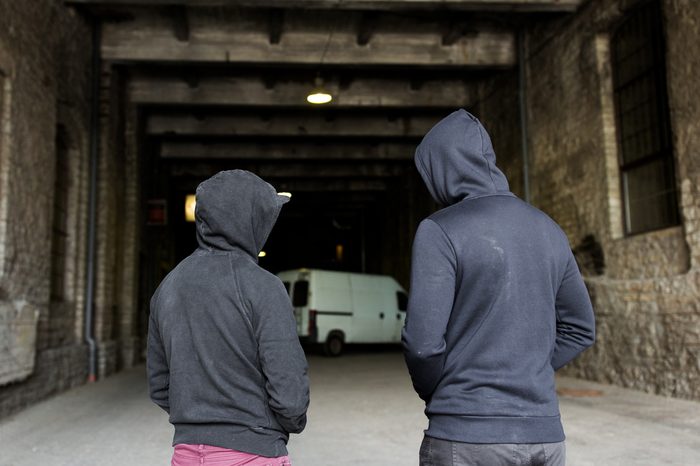
We work in groups
Contrary to the image of the solitary trickster you’ve conjured in your mind, pickpockets often team up in large groups to get their victims. “Usually, one of the gang will distract the mark, often with a fake tourist survey or petition, or by ‘accidentally’ spilling something on them,” says Lewis Sage-Passant, MSyl, a former British military intelligence officer and director of travel security firm How Safe Is My Trip. “While the victim is distracted, their accomplice will take the opportunity to grab items from unguarded pockets or bags, sometimes going so far as to cut through the material of bags to access the contents.” If a stranger does approach you on the street, Sage-Passant recommends looking around for a potential accomplice to determine if the stranger is being genuine or has darker plans in mind.
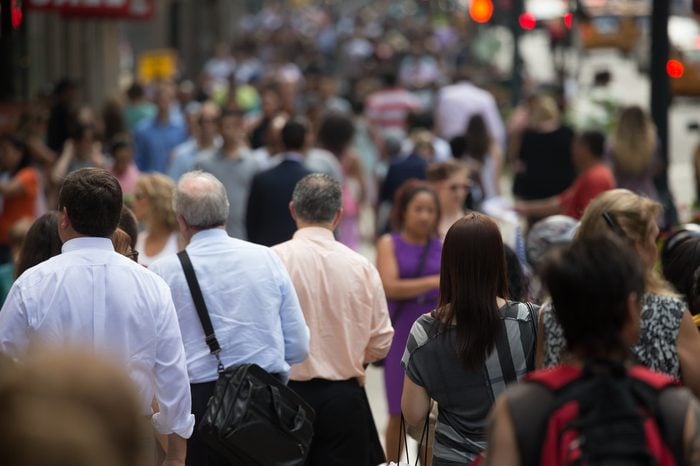
We love high-traffic areas
Think transportation hubs, busy streets, and any other place where you expect to have limited personal space. “In these locations, [pickpockets] know that people expect some level of contact with strangers and so people are less likely to notice slight bumps or jostling,” says Michael Woodrum, CEO of travel security company Anjin Secure. “Also, the movements of victims is predictable. The criminal can time his movements with the rhythm of the victim.”
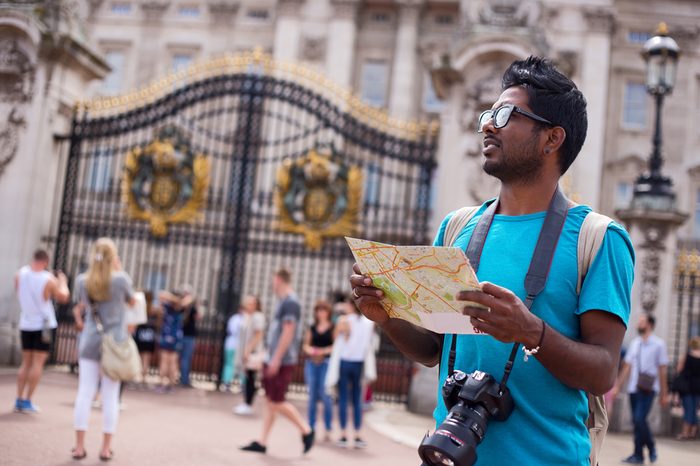
We move in when you look most distracted
Another reason that pickpockets look for victims in high-traffic areas is that these are usually areas of transition. If you get off a train in a city you’ve never visited before, you’ll need time to adjust to your surroundings. That’s when pickpockets strike. “People are most disoriented when they move from one environment to the other. The extreme example is walking out of a movie theater in the middle of the summer where you go from low-light and loud audio to bright sunshine,” Woodrum says. “A pickpocket’s actions are not necessarily seen as out of the ordinary as the mind has not established what normal is.”
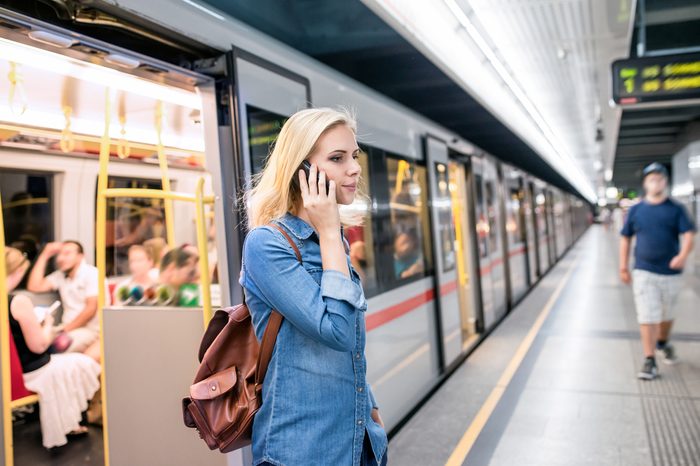
Don’t think you’re safe on public transportation
Frequent traveler Michèle Foster has been pickpocketed nine times—and seven of those were on public transportation. It can be easy to let your guard down on the bus or subway—at least you’re not on the street, right?—but she advises that people stay alert. You may think the person next to you bumped into you because of the crowds, but he could be trying to reach into your pocket. “Keep your purse or wallet in front of your body (front pocket or hanging across your stomach rather than your back) and keep your hands firmly on the opening so you can feel anything that tries to get inside,” she says.

Be wary of tourist attractions
This may seem like an obvious tip for international travelers, but it’s worth repeating. “Pickpocketers prey on these parts of the city the most, as locals usually tend to stay away from tourist attractions, and tourists in general have much more cash or valuable possessions on them,” says Chris Young, owner of The Young Travelier. How can you be a tourist without acting like one? Walk with purpose, Young says. It makes you appear more vigilant and therefore tougher to swindle. Here are 9 more travel mistakes you should never make on vacation.
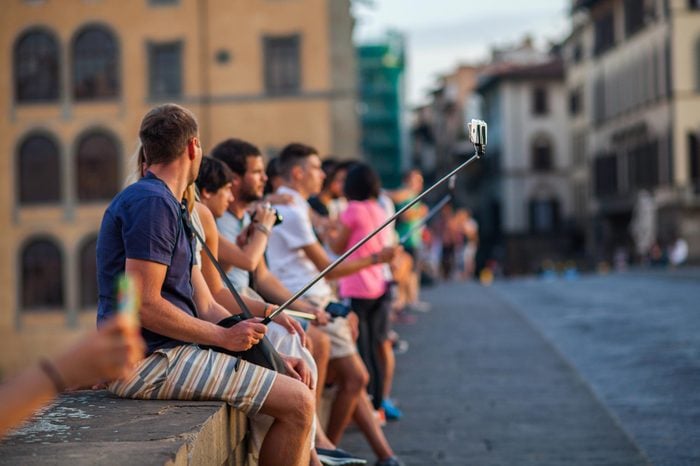
Your clothes are a dead giveaway
The stereotype is true: American tourists stick out like a sore thumb when they travel, making them prime targets for pickpockets. Instead of throwing on a T-shirt to rep your alma mater, try to dress like the locals. “When I lived in Italy, I brought nice jackets and dresses. When I went to China, I brought light and simple pieces that weren’t too flashy,” says Kara Harms of Whimsy Soul. “Nothing ever has large English words or big American brands on them. Wearing outfits that shout, ‘HEY I DON’T LIVE HERE,’ is asking to be stolen from.”
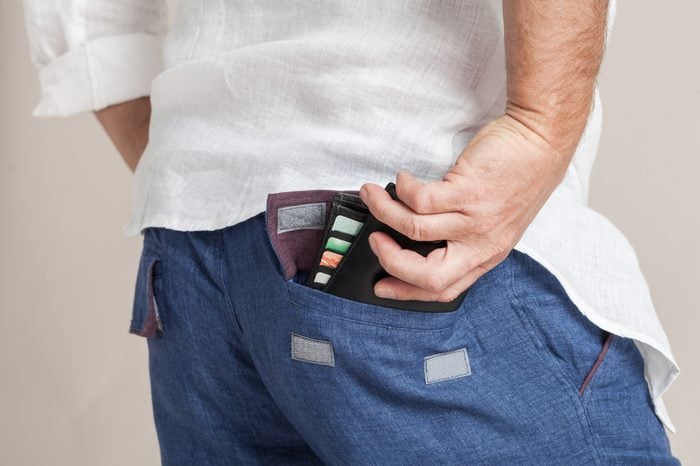
Don’t be too cautious
You already know that looking distracted and carrying valuables are moves to avoid, but doesn’t being cautious prevent you from getting pickpocketed in the first place? Not necessarily, Sage-Passant explains. “Somewhat counter-intuitively, travelers can also make themselves more vulnerable by being obviously over-protective of valuables. By constantly patting your pockets to check on your wallet, you are signaling to very observant pickpocketers that the pocket contains something of value.”
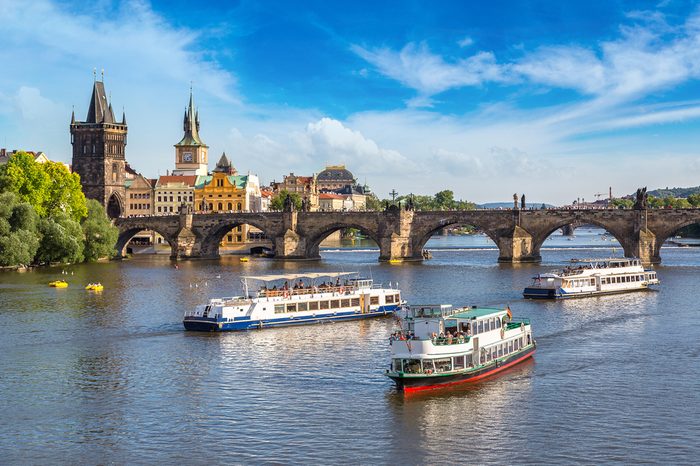
We’re most notorious in Europe
According to a list released by TripAdvisor, eight of the top ten cities where you’re most likely to be pickpocketed are in Europe. The top three are Barcelona, Spain; Rome, Italy; and Prague in the Czech Republic. Yet those stats shouldn’t dissuade you from traveling, says Morgan Statt, a health and safety investigator for ConsumerSafety.org. One way to stay ahead of potential thieves is by being mindful of signs that say “Beware of Pickpockets”—but not for the reason you think. “Pickpockets will often hang around areas where these signs can be seen,” Statt says. “Often when a traveler notices this, the first thing they’ll do is check the belongings that they have on them, a dead giveaway for thieves who are looking to steal.” Another reason why being too protective can actually work against you. Check out these 13 “dangerous” countries that are actually safer than you think.
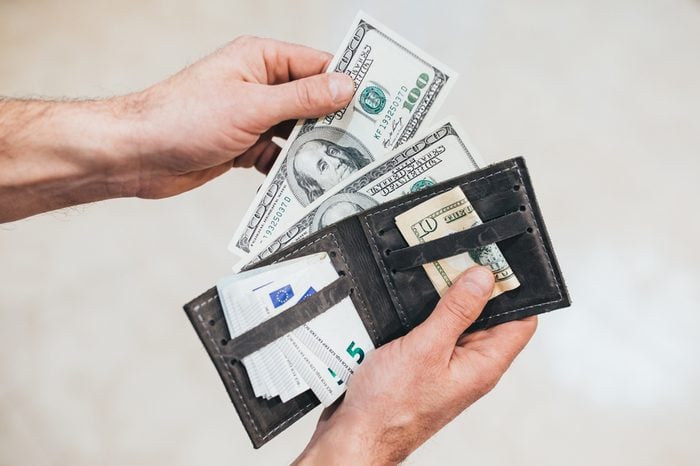
We spy on your wallet
Pickpockets don’t just look for easy targets; they look for lucrative ones. “Try to camouflage your wealth and your use of money,” says Ashley Hampton, PhD, a psychologist who works in the federal prison system. “For example, when paying for something, do not pull out a wad of cash and count it out.” She also advises women against wearing expensive jewelry or a lot of jewelry while traveling. It implies that there’s something of value in their purses, as well.
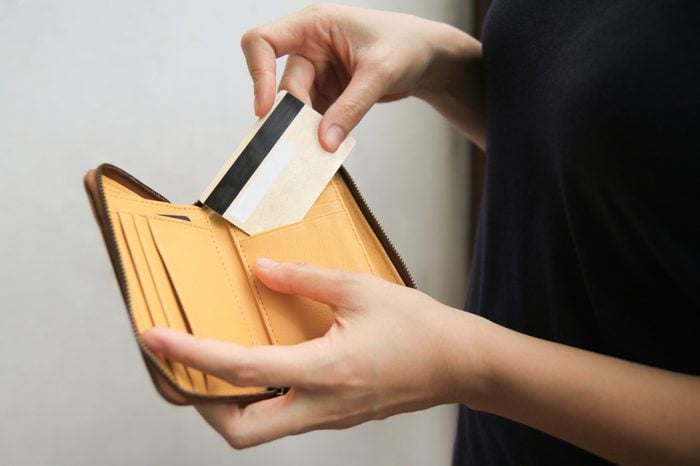
We try to make digital steals, too
Carrying less cash in lieu of paying with a credit card seems like a natural defense against getting your money stolen, but thieves are adapting to modern technology, too.”E-pickpocketers,” as Young calls them, will try to steal your credit card numbers by waiting for you to take out your card to make a purchase and snapping a picture of the numbers with a high-res digital camera or camera phone. That could end up being more damaging than stolen cash. “This is a new type of theft that happens quite often and which the public isn’t very aware of,” Young says. Sure, you expect thieves to target your cash and cards.
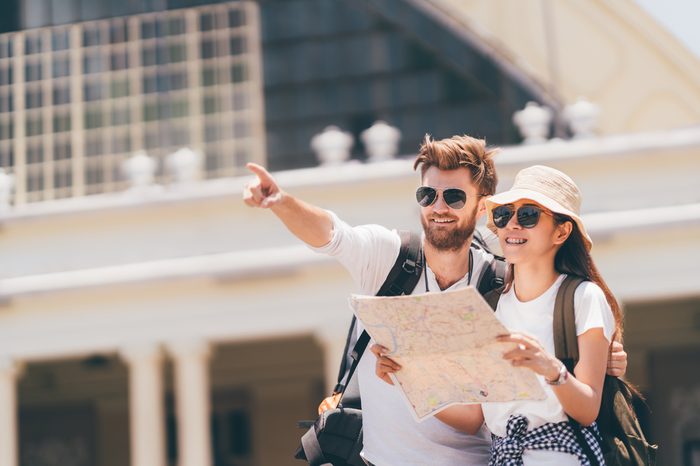
We’ll take advantage of nice people
“Pickpockets prey on the fact that people are often willing to help others, and they’ll use this to their advantage,” Statt says. “For example, one pickpocket working as a team will drop something that you’ll offer to pick up, while the second pickpocket uses the distraction as an opportunity to steal your belongings. Be wary of any sort of help you’re offering, since it may hurt you in the long run.”
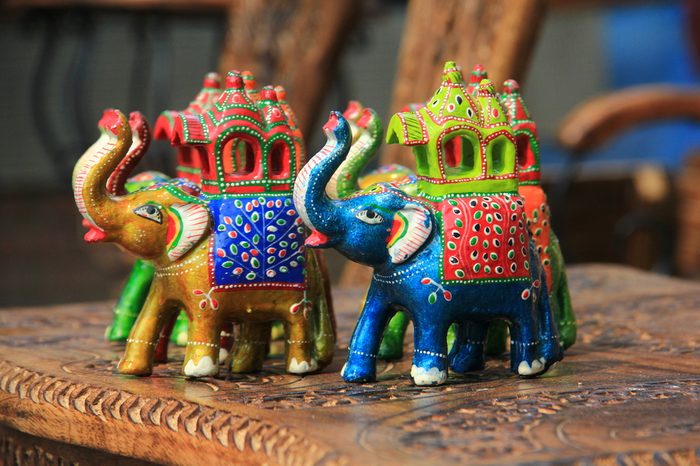
Souvenir shopping means souvenirs for us, too
When you buy souvenirs on vacation, you probably buy some mementos for yourself and some for friends and stuff them all in one bag. Odds are, that bag doesn’t have a zipper or clasp at the top, which means any skilled hand could easily take out whatever items are on top. If you can’t fit everything securely in one bag, it’s worth making a second shopping trip, says Leigh Ann, author and creator of Countries and Cultures travel blog. “There is no point rushing to buy something only to have it stolen ten minutes later.” Don’t miss these 22 tips for having a safer vacation.
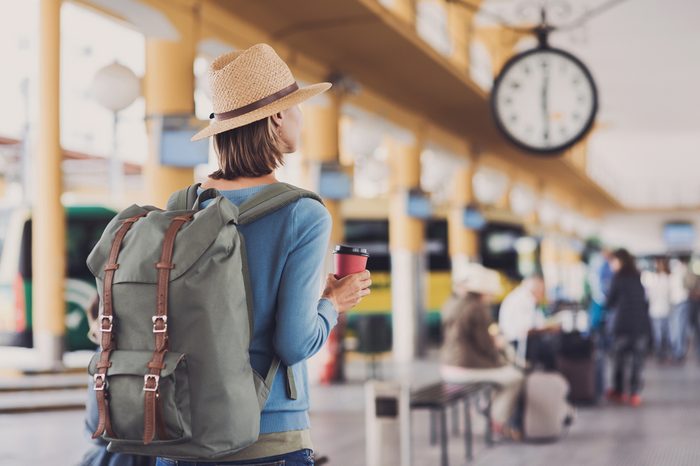
Situational awareness is your best strategy
Robert Siciliano, identity theft expert with Hotspot Shield, describes situational awareness as “being aware of every situation you are in, looking for anyone paying any unwanted attention to you, and understanding what’s going on 50 to 100 feet around the perimeter of your body at all times.” The better you understand your surroundings, the quicker you’ll notice someone or something out of place, including any suspicious looking characters.
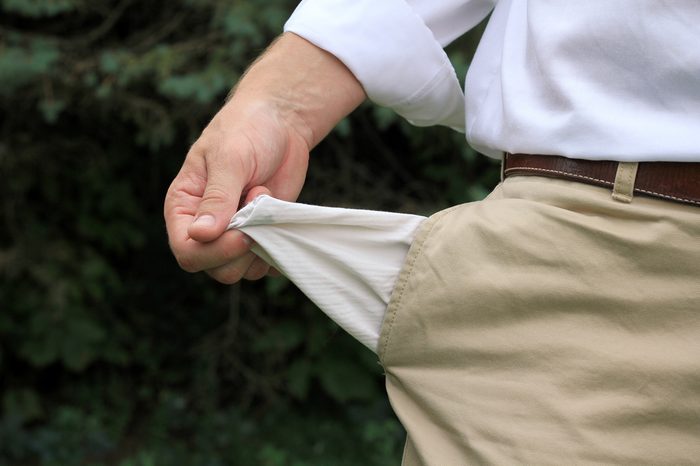
Keep your pockets empty
While storing valuables in front pockets reduces the risk of them being taken, you can almost eliminate that risk by not putting anything in there at all. That means no phone, wallet, money, jewelry—anything you don’t want to get stolen should be kept in a closed bag, Ann says. Make sure you know the signs that a pickpocket is nearby, and take precautions so that the pocket that gets picked isn’t yours! As far as protecting what’s in your bag…
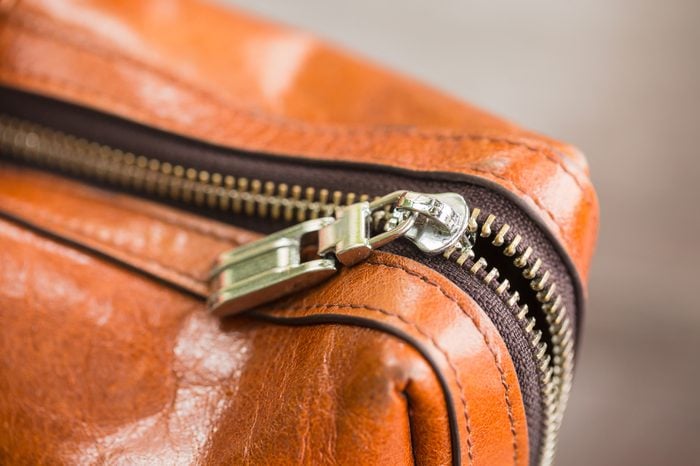
Zippers are the first line of defense
“I always look for a bag that has zippers so wandering hands can’t reach into my purse without me knowing,” Harms says. “Then, I always sling that bag over my body and keep my right hand firmly grasping the zipper. That way, it’s harder for thieves to unzip my purse. I don’t ever let go of my zipper in crowded areas and find that works to deter most pickpockets.”
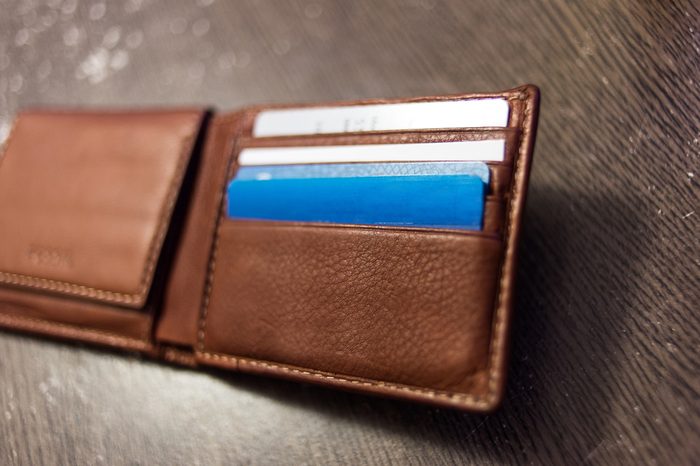
We’ll fall for decoys
If you’re visiting a place that’s known for pickpockets or that has a high crime rate, Sage-Passant recommends carrying an old wallet with a few expired credit cards as a decoy. In the event of a mugging, you’ll have something to hand over and the thieves won’t take the time to check the expiration dates until you’re long gone. You should also know these 10 self-defense moves that can save your life.
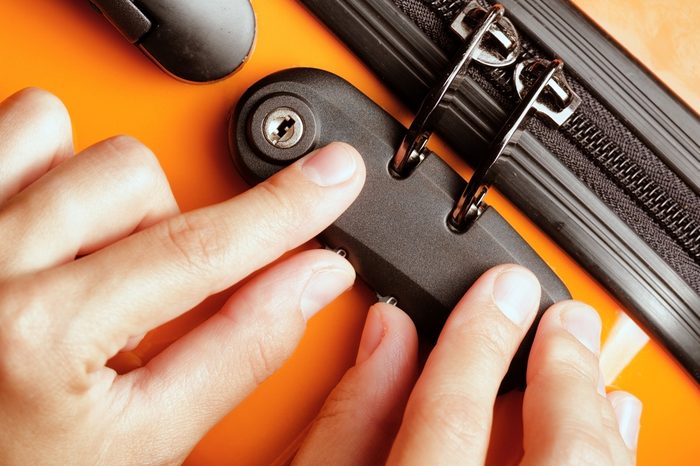
Invest in anti-theft products
Pants specifically designed to deflect pickpockets? Yep, they exist. Aviator USA sells what USAToday called “the best travel jeans in the world,” and they may just be right. The pants have deep front pockets that can comfortably fit your phone or passport, have hidden zippered pockets inside back pockets, and feel comfortable enough to wear on a long flight.
An anti-theft purse is another secure and stylish way to be one step ahead of pickpockets. Harms recommends Arden Cove bags because they look like a normal purse and come with locking zippers, slash-resistant fabric, cut-proof straps, and RFID protection to prevent digital theft. Plus, they’re waterproof. “If this isn’t the holy grail of travel bags, I don’t know what is,” she says.
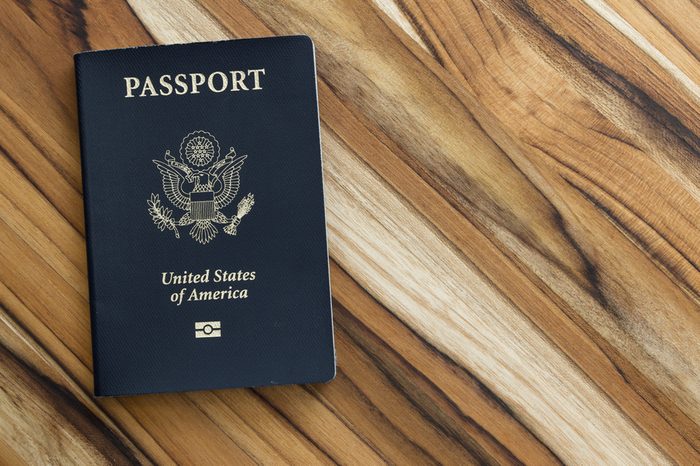
Don’t travel with things we could take
In reality, the only way to ensure your things don’t get stolen is to not carry them with you in the first place. “I have a rule that when I travel, I always parse out what I need and keep the rest of it locked in a safe,” Young says. “This can mean that I will only keep a drivers license and one credit card and just a bit of cash on me, in the event that if I lose it, I still have a backup card, more cash, and another ID (passport) in my hotel.” Next, make sure you know these 21 things a burglar won’t tell you.